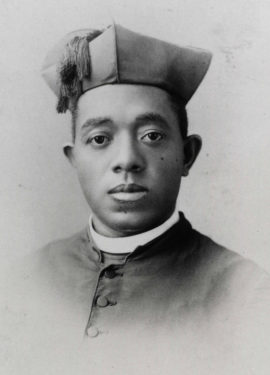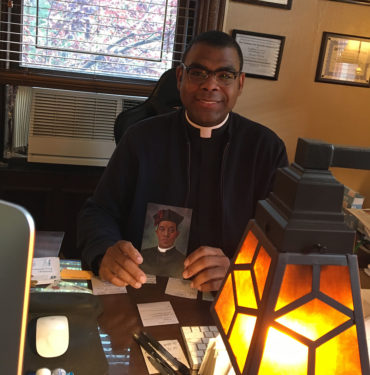A former runaway slave who grew up to become the first African-American Catholic priest is now one step closer to being the first black American saint.

Pope Francis recognized the heroic virtue of Father Augustus Tolton and on June 12 declared him “venerable” within the Church. With that decree, Father Tolton is still two steps away from canonization, but Catholics can pray directly to the priest as an intercessor before God.
That announcement holds a significant place in the heart of Father Alonzo Cox, the diocese’s coordinator of the Vicariate of Black Catholic Concerns, who last year helped bring a live theatre production about Father Tolton’s life to the diocese.
Father Cox oversees three churches in his parish that serve a predominantly black congregation: Our Lady of Victory, Holy Rosary and St. Peter Claver. On his desk is a prayer card with Venerable Tolton.
“He’s a great example just for me, as a young African-American priest,” Father Cox said, “being able just to see his story and how he was able to get through all of the things that he was able to get through and now we’re at the brink of sainthood.”
For seminarian Jeremie Tsonya who just completed his second year at the House of Formation in Douglaston, he said Father Tolton’s personal story of perseverance to follow God’s calling is inspiring. Tsonya recalled with detail the life of the runaway slave on the road to sainthood. During one recollection, particularly when God called Father Tolton to heaven at the age of 43, Tsonya said it was very sad.
“I don’t know why God called him so early,” Tsonya said. “God how can you call that person so early, he’s doing so well.”
Nonetheless, the young seminarian didn’t discredit that God was involved in the details of Father Tolton’s life — whether how his family escaped slavery or how he eventually was ordained to the priesthood in Rome.
“He’s a very important figure for us African-Americans trying to become a priest even though the times and the situations are not the same,” Tsonya said. “When you’re looking at the life of Father Tolton, you have to pray that God will help you find people who are destined to guide you in your discernment. That’s extremely important.”
Started in Slavery
The story of Father Tolton begins in slavery in Missouri. His baptismal record at the time read: “A colored child born April 1, 1854, son of Peter Tolton and Martha Chisley, property of Stephen Elliot.”

Augustus’ father was presumed dead while fighting for the Union Army in the Civil War. His mother risked her life to escape slavery and ran away with her three young children, including her 20-month-old daughter. They crossed the Mississippi River on a dilapidated boat that Union men helped them find. They were met by black and white workers who were on their way to work and offered the fleeing family food and directions to the town of Quincy in the free state of Illinois.
The family finally had a place to call home, where they were able to grow in their Catholic faith and also work to make ends meet. Augustus’s faith continued to grow, as did his conviction that God was calling him to the priesthood.
His family attended St. Boniface Church, a German parish with a small black presence. When his mother enrolled Augustus in the all-white parish school, it caused such an uproar that in less than a month, he withdrew. At 14, he still did not know how to read, but he entered an all-black public school.
He was ridiculed for being darker than the others, for being half-orphaned and for being illiterate. Nonetheless, he made remarkable progress.
An Irish priest, Father Peter McGirr, came to be Augustus’s pastor at St. Lawrence parish. Father McGirr told Augustus that if he were to enroll in the St. Lawrence parochial school, the priest would assure him that there would be no trouble. He enrolled and received extra academic help. Father McGirr pacified the parishioners with homily after homily on the meaning of being a good Christian.
Despite his eventual acceptance into a predominantly white parish, the seminary would be a whole new challenge. Augustus felt and wanted to answer his vocation, but no seminary in the United States would accept him. Eventually, with the help of Father McGirr and other priests, young Augustus made his way to Rome to be educated and ordained.
In April 1886, at the age of 32, the young former slave was ordained at the Basilica of St. John Lateran in Rome. He dreamed of being a missionary in Africa, inviting other young men into the fold of the priesthood.
However, God had other plans and Father Tolton was sent back to his hometown of Quincy. Although he did not want to go, the young priest embraced his ministry fully, becoming a pastor who loved all people, holding no grudges. His sermons were inspiring and his presence was charismatic. Even though jealousy arose from both Protestant black ministers and other Catholic priests, his holiness continued to grow.
It was when Father Tolton was transferred to Chicago where he began work rebuilding St. Monica Church, named after the African mother of St. Augustine. Tireless work and evangelization efforts eventually played a detrimental role in the decline of his health.
After he returned from a priest retreat, Father Tolton collapsed from heat exhaustion. He was taken to the hospital and then passed away on July 9, 1897, at the age of 43.
More than 100 years later, Father Tolton was declared a “Servant of God” and now, “Venerable.”
Father Cox said Catholics should continue to pray through Father Tolton for unity and that God will call more young men, particularly African-Americans, “to the beautiful vocation that is priesthood.”
“I think in today’s day and age, Father Tolton would be a great example of what it means to welcome the stranger, to welcome God’s people to the flock and embracing them as God would embrace all of His people,” Father Cox said.
